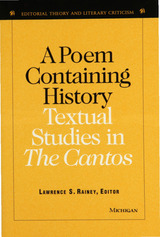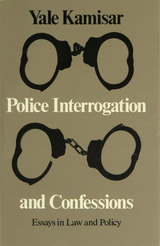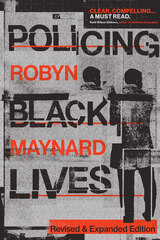5 books about Aliens in motion pictures

Alien Identities
Exploring Differences in Film and Fiction
Edited by Deborah Cartmell, Heidi Kaye, I. Q. Hunter, and Imelda Whelehan
Pluto Press, 1999
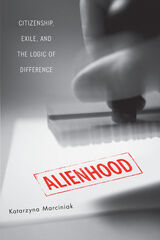
Alienhood
Citizenship, Exile, And The Logic Of Difference
Katarzyna Marciniak
University of Minnesota Press, 2006
“Alien” has a double meaning in the United States, suggesting both “foreigner” and “extraterrestrial creature.” In Alienhood, Katarzyna Marciniak explores this semantic duality. Interrogating the dominant images of aliens in American popular culture—and in legal, historical, linguistic, and literary discourses—Marciniak examines “alienhood” and the impact it has on the daily experiences of migrants, legal or illegal.
Using examples from exilic literature and cinema, including the works of Julia Alvarez, Eva Hoffman, Gregory Nava, and Roman Polanski, Alienhood theorizes multicultural experiences of liminal characters that belong in the interstices between nations. Investigating gendered, racialized, and ideological formations of “aliens,” Marciniak’s readings put into dialogue narratives from both the second world and the third world in relation to “first worldness.” This dialogue problematizes the meanings of “transnational” and brings the so-called second world into these debates. In doing so, Marciniak reorients the study of immigrant or exile subjects beyond the celebrated notion of transnationalism.
With its unique focus on “aliens” in relation to discourses of immigration, exile, and displacement, Alienhood shows how transnationality is, for many dislocated people, an unattainable privilege.
Katarzyna Marciniak is associate professor of English at Ohio University.
Using examples from exilic literature and cinema, including the works of Julia Alvarez, Eva Hoffman, Gregory Nava, and Roman Polanski, Alienhood theorizes multicultural experiences of liminal characters that belong in the interstices between nations. Investigating gendered, racialized, and ideological formations of “aliens,” Marciniak’s readings put into dialogue narratives from both the second world and the third world in relation to “first worldness.” This dialogue problematizes the meanings of “transnational” and brings the so-called second world into these debates. In doing so, Marciniak reorients the study of immigrant or exile subjects beyond the celebrated notion of transnationalism.
With its unique focus on “aliens” in relation to discourses of immigration, exile, and displacement, Alienhood shows how transnationality is, for many dislocated people, an unattainable privilege.
Katarzyna Marciniak is associate professor of English at Ohio University.
[more]

German Film after Germany
Toward a Transnational Aesthetic
Randall Halle
University of Illinois Press, 2007
What is the work of film in the age of transnational production? To answer that question, Randall Halle focuses on the film industry of Germany, one of Europe's largest film markets and one of the world's largest film-producing nations. In the 1990s Germany experienced an extreme transition from a state-subsidized mode of film production that was free of anxious concerns about profit and audience entertainment to a mode dominated by private interest and big capital. At the same time, the European Union began actively drawing together the national markets of Germany and other European nations, sublating their individual significances into a synergistic whole. This book studies these changes broadly, but also focuses on the transformations in their particular national context. It balances film politics and film aesthetics, tracing transformations in financing along with analyses of particular films to describe the effects on the film object itself. Halle concludes that we witness currently the emergence of a new transnational aesthetic, a fundamental shift in cultural production with ramifications for communal identifications, state cohesion, and national economies.
[more]
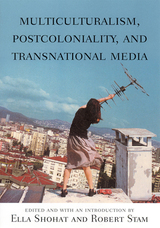
Multiculturalism, Postcoloniality, and Transnational Media
Edited by Ella Shohat and Robert Stam
Rutgers University Press, 2003
Reflecting the burgeoning academic interest in issues of nation, race, gender, sexuality, and other axes of identity, Multiculturalism, Postcoloniality, and Transnational Media brings all of these concerns under the same umbrella, contending that these issues must be discussed in relation to each other. Communities, societies, nations, and even entire continents, the book suggests, exist not autonomously but rather in a densely woven web of connectedness.
To explore this complexity, the editors have forged links between usually compartmentalized fields (especially media studies, literary theory, visual culture, and critical anthropology) and areas of inquiry-particularly postcolonial and diasporic studies and a diverse set of ethnic and area studies. This book, which links all these issues in suggestive ways, provides an indispensable guide for students and scholars in a wide variety of disciplines. Essays in this groundbreaking volume include Julianne Burton-Carvajal on ethnic identity in Lone Star; Manthia Diawara on diasporic documentary; Hamid Naficy on independent transnational film genres; Robyn Wiegman on whiteness studies; Faye Ginsburg on indigenous media; and Jennifer Gonzßles on race in cyberspace; Ana M. Lopez on modernity and Latin American cinema; and Inderpal Grewal and Caren Kaplan on Warrior Marks and multiculturalism and globalization.
To explore this complexity, the editors have forged links between usually compartmentalized fields (especially media studies, literary theory, visual culture, and critical anthropology) and areas of inquiry-particularly postcolonial and diasporic studies and a diverse set of ethnic and area studies. This book, which links all these issues in suggestive ways, provides an indispensable guide for students and scholars in a wide variety of disciplines. Essays in this groundbreaking volume include Julianne Burton-Carvajal on ethnic identity in Lone Star; Manthia Diawara on diasporic documentary; Hamid Naficy on independent transnational film genres; Robyn Wiegman on whiteness studies; Faye Ginsburg on indigenous media; and Jennifer Gonzßles on race in cyberspace; Ana M. Lopez on modernity and Latin American cinema; and Inderpal Grewal and Caren Kaplan on Warrior Marks and multiculturalism and globalization.
[more]

Re-takes
Postcoloniality and Foreign Film Languages
John Mowitt
University of Minnesota Press, 2005
Exploring several dimensions of the problem of "film languages," this volume engages the complications inherent in the study of the "other" and investigates the intricate relationship between postcoloniality, national identity, ideology, and filmmaking. Author John Mowitt establishes how Eurocentrism sustains both the concept of the foreign language film and the flawed initiative of multiculturalism. Using bilingualism and the concept of foreign film language, Re-takes pushes film studies beyond both linguistics and psychoanalysis to resituate is within the networks of global cultural communication.Through close readings of the bilingual films of Senegalese filmmaker Sembene Ousmane and Bolivian filmmaker Jorge Sanjines, Mowitt articulates the poetics and politics of postcoloniality in the global cinematic field, and challenges film studies to reflect on the relation between its organizing analytical distinctions - national and foreign, textual and institutional - and its position within globalization. Examining how elements involved in bilingual films have implications for the way academic intellectuals classify and misappropriate cultural forms, Re-takes is a provocative intervention into ongoing discussions of the changing nature of film and media studies.
[more]
READERS
Browse our collection.
PUBLISHERS
See BiblioVault's publisher services.
STUDENT SERVICES
Files for college accessibility offices.
UChicago Accessibility Resources
home | accessibility | search | about | contact us
BiblioVault ® 2001 - 2025
The University of Chicago Press


